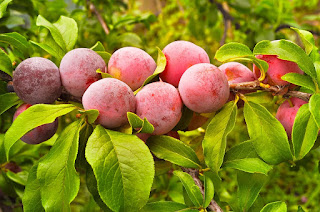 |
| imaginary picture |
Eating plums can provide several benefits due to their nutritional content, but there may be some disadvantages to consider as well. Here are some of the potential benefits and disadvantages of eating plums:
Benefits of eating plums:
1.Nutritional value: Plums are a good source of vitamins and minerals, including vitamin C, vitamin A, potassium, and dietary fiber. These nutrients contribute to overall health and support various bodily functions.
2.Antioxidant properties: Plums are rich in antioxidants, such as phenolic compounds and vitamin C, which help protect the body against damage from harmful free radicals. Antioxidants can contribute to reducing the risk of chronic diseases, such as heart disease and certain types of cancer.
3.Digestive health: Plums contain dietary fiber, which aids in maintaining a healthy digestive system. Fiber helps promote regular bowel movements, prevent constipation, and support gut health.
4.Hydration: Plums have a high water content, which can contribute to overall hydration when consumed as part of a balanced diet.
5.Weight management: Plums are relatively low in calories and high in fiber, making them a satisfying snack that can help with weight management by promoting feelings of fullness and reducing the likelihood of overeating.
Disadvantages of eating plums:
1.Sugar content: While plums offer natural sugars, they can be relatively high in fructose. People who are monitoring their sugar intake, such as those with diabetes or individuals on a low-sugar diet, may need to consume plums in moderation.
2.Allergies: Some individuals may be allergic to plums or other stone fruits. If you have a known allergy or experience any adverse reactions after consuming plums, it's best to consult a healthcare professional.
3.Oxalate content: Plums, like many other fruits, contain oxalates. For individuals prone to kidney stones or those advised to limit oxalate consumption, excessive intake of plums may not be recommended.
4.Pesticide residues: Conventionally grown plums may contain pesticide residues. To minimize exposure, consider choosing organic plums or thoroughly washing them before consumption.
 |
| imaginary picture |
It's worth noting that the potential disadvantages listed above are generally not a concern for the average person when plums are consumed as part of a balanced diet. As with any food, moderation and individual considerations should be taken into account based on personal health conditions and dietary needs.
| Subscribe to our YouTube channel by clicking on the logo |






